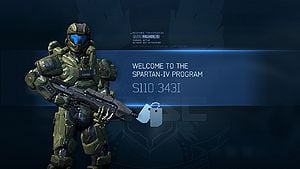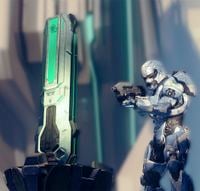Infinity (mode)
From Halopedia, the Halo wiki
"WE'VE GOT A NEW CONTACT, UNKNOWN CLASSIFICATION!" This article may contain information based upon upcoming, unreleased, or recently-released content, and may not be fully complete. Additionally, the information may be subject to change if it is based on pre-release material. Please update it as soon as any relevant and accurate material is available.
|
Infinity is the multiplayer component of Halo 4. It consists of War Games, the competitive multiplayer mode, Forge mode, as well as the episodic cooperative campaign Spartan Ops. The mode is named after the prototype warship UNSC Infinity, which forms the in-universe background for the mode as the base of operations for the SPARTAN-IV supersoldiers, the players' avatars for Infinity multiplayer. In contrast to previous Halo titles, Infinity is designed to "blur the lines" between fiction and multiplayer gameplay, with the various multiplayer modes being tied into Halo universe canon.[1][2][3]
Background and development
Prior to the beginning of development on Halo 4, 343i General Manager Bonnie Ross and Franchise Development Director Frank O'Connor set the framework of the new studio's mission which entailed that all pieces of existing and future fiction from the games, novels, comics, etc. would be interwoven and share content from each other.[4] Among this would be the multiplayer component for Halo 4, which would later include the introduction of Spartan Ops; " Wrapping the whole thing together allowed us to make sure that all the fiction in all of those pieces actually mattered – in this case, it connects directly to your career as well as the narrative experience."[4]
War Games
- Main article: War Games
Competitive multiplayer, known as "War Games," pits players against one another in adversarial combat training in simulated environments in the advanced combat deck of the Infinity.[3] However, due to the emphasis on the SPARTAN-IV supersoldiers, players do not have the option to use Sangheili for their multiplayer character.[5]
343 Industries is aiming to provide a "brand new experience" in Halo 4 multiplayer. This includes a reworking of the series' traditional balance system. For example, the player progression system is more extensive, allowing players to choose between various modifications which have an effect on gameplay, in addition to aesthetic armor permutations similar to the prior games.[6][7][8] Players are also able to customize their loadouts,[9] being able to choose between various armor abilities as well as new customizable features, known as Support Upgrades and Tactical Packages. Tactical Packages offer a small performance boost to a chosen gameplay feature, such as the player's shield or weapon carrying capacity. Support Upgrades function similarly, and feature such improvements as motion tracker upgrade and an increase in the player's maximum ammunition.[6] Halo 4 also introduces a new gameplay enhancement feature referred to as "Specializations". Specializations unlock different armor sets, emblems, visor colors, weapon and armor skins, and armor mods, which work similar to tactical packages and support upgrades.[10]
The multiplayer gameplay of Halo 4 has been described as being "much more fast-paced, more intense and visceral" than in the prior games.[8] Weapon pickups on maps are marked on the player's heads-up display,[7] and players are able to call in ordnance drops, containing power-ups or weapons, during War Games matches.[6] Some multiplayer gametypes include Slayer, Infinity Slayer, and Regicide. Power-ups available in Infinity Slayer include Overshield, Damage Boost, and Speed Boost.[11]
Maps
Unlike Halo: Reach, where the original multiplayer maps were shared in the campaign as gameplay spaces, all multiplayer maps in Halo 4 are purpose-built for multiplayer alone much like in the first three Halo games.[8] 343 Industries cooperated with Certain Affinity in the production of the multiplayer maps for Halo 4.[12][13]
Template:Halo 4 War Games Main
Spartan Ops
- Main article: Spartan Ops
Spartan Ops is a secondary campaign and a replacement to the Firefight mode featured in Halo 3: ODST and Halo: Reach.[5] Much like traditional campaign cooperative play, Spartan Ops allows up to four players to participate in weekly objective-based episodic missions;[5][14] this new mode is being likened to a second full-scale campaign for the game.[4] Set six months after the end of the Halo 4 campaign, Spartan Ops continues the story of the UNSC Infinity and her crew, putting players in the role of SPARTAN-IV Fireteam Crimson as they embark on missions across Requiem. Compared to a season of a television program, each "episode" of Spartan Ops features a pre-rendered cinematic and five playable missions complete with new events, characters, locations, and gameplay challenges, totaling up to 12 hours of new gameplay.[15][16] The development of Spartan Ops has seen the largest influx of new characters, along with corresponding facial and voice talent, and gameplay/sandbox elements into any property of the Halo franchise since 2001.[17] 343 Industries will be supporting additional Spartan Ops missions for months after launch of the game and unlike Reach challenges, players have the opportunity to play from the beginning of the episodic campaign regardless of when they started playing. The first "season" is included with the price of the game, though 343i has not ruled out charging players for additional Spartan Ops seasons.[18] Frank O'Connor has stated that Spartan Ops will "bridge the gap" between the events of Halo 4 and the future release of its sequel Halo 5.[18]
The development of Spartan Ops came to fruition under the ideals of persistent, fresh replayability and small additions to the fiction surrounding the Reclaimer Trilogy and ancillary content. [4] Each episode of the series, gameplay-wise, is set up with meaning to enhance the significance of the events you are playing through, and as such, simplistic single-objective missions will not be a focus of Spartan Ops. Frank O'Connor in an interview with The Guardian states that the stories and events have been loosely laid out for "a few years"[4]; the success or failure of Spartan Ops may lead to a continuation of the series past 2012-2013 with a "known beginning, a middle, and an end." [4] The first season of Spartan Ops as of June 2012 has been noted as being "very rigid" with the direction of the story having already been mapped out from beginning to end.
Season One will consist of ten episodes and a total of fifty missions (five missions per episode) released following the launch of Halo 4.[16] Spartan Ops Season One will run from its premiere alongside Halo 4's worldwide release on November 6th, 2012 to early 2013, with the first five episodes being released on a weekly basis following the launch and the second half (episodes 6-10) following in early 2013, beginning with the release of Episode 6 on January 21.[19]
Forge
- Main article: Forge
Forge, the multiplayer map editing feature first included in Halo 3, returns for Halo 4. [14][17] It was first shown to public audiences at the Rooster Teeth Expo on July 7th, 2012 in a presentation highlighting various new features included with this newest iteration of Forge mode.[17] Co-developed with Certain Affinity, the Halo 4 Forge mode has three dedicated maps with unique object palettes and a number of improvements over its predecessors, including the ability to use "magnets" to snap objects to one another or duplicate any object at will.[13]
Sources
- ^ Game Informer (May 2012), pages 46-47
- ^ Halo 4 Infinity Multiplayer
- ^ a b Digitalspy.co.uk: Halo 4 interview: 343 Industries on multiplayer, new forms of story
- ^ a b c d e f The Guardian: E3 2012: Frank O'Connor on Halo 4 – Spartan Ops could run for years
- ^ a b c IGN.com: Spartan Ops and Infinity Change Halo 4 Multiplayer
- ^ a b c Halo 4 Official Site: GAMEPLAY
- ^ a b Venturebeat.com: 11 new things we’ve learned about Halo 4 (with video)
- ^ a b c Guardian.co.uk: Halo 4 multiplayer revealed: Master Chief meets Call of Duty?
- ^ Gamefront.com: Halo 4 Demo Report
- ^ Halo Waypoint The Halo Bulletin 8.15.12
- ^ Halo Waypoint: The Halo Bulletin: 7.6.12
- ^ Official Xbox Magazine online.com 343 Industries: Halo 4 will "re-inject some new life" into Halo multiplayer
- ^ a b GameSpot: Exclusive Halo 4 Forge Mode Details
- ^ a b Game Informer: Halo 4 Special Podcast
- ^ Game Informer: May 2012
- ^ a b Little English Halo Blog: New Halo 4 Info Blowout via ExpertZone!
- ^ a b c Rooster Teeth Expo: Halo 4 presentation
- ^ a b NYDailyNews.com: SYSTEM UPDATE: Halo 4 preview, with our first glimpse into return of Master Chief
- ^ YOuTube: Spartan Ops Episodes 6-10 Trailer


